April 2011 Archives
The theme for this year’s Earth Week was Food: You are what you eat. Do you know what you are? Playing off the horror flick “Children of the Corn,” we hoped to draw attention to the serious food issues facing us today, including the prevalence of corn in our food. With the support of our partners, including Green Campus Initiative (GCI), the Special Collections Research Center, the Spiritual Life Office at Rockefeller Chapel, the University of Chicago Community Service Center, and the Office of the Secretary of the University, Sustainability at the University of Chicago hosted numerous events throughout the week.
We want to thank the University community for making Earth Week 2011 such a success—we could not have done it without you!
To view the full Earth Week 2011 schedule, click here. If you have any comments on our programming during the week please send your feed back to: officeofsustainability@uchicago.edu.
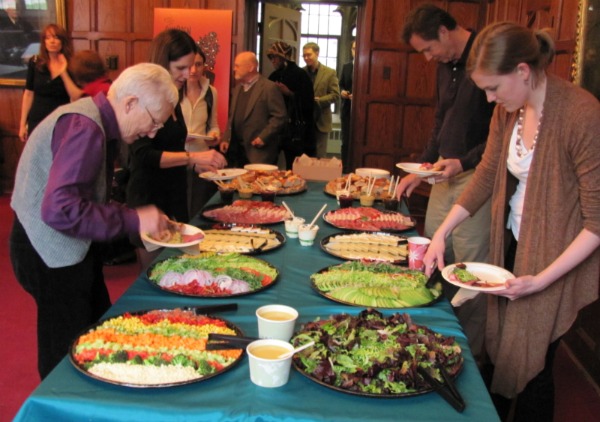 Guests at our keynote event: Adam, Malcolm, Martin, and Food: Inalienable Resources, serve themselves before listening to Brandon Johnson, Executive Director of the Washington Park Consortium, speak about urban agriculture and food through the lens of civil rights leaders. This dinner event was catered by Hannah’s Bretzel and Argo Tea. Photo by Vikram Dwarkadas
Guests at our keynote event: Adam, Malcolm, Martin, and Food: Inalienable Resources, serve themselves before listening to Brandon Johnson, Executive Director of the Washington Park Consortium, speak about urban agriculture and food through the lens of civil rights leaders. This dinner event was catered by Hannah’s Bretzel and Argo Tea. Photo by Vikram Dwarkadas
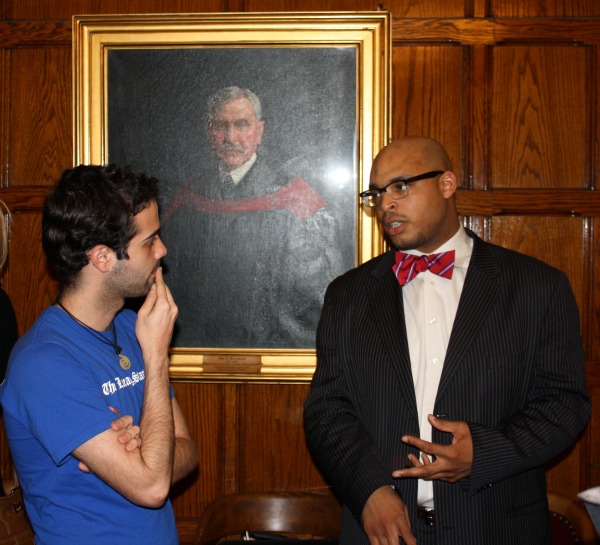 Ignacio Tagtachian, AB ‘11 and Sustainability Intern, talks with keynote speaker, Brandon Johnson, Executive Director of the Washington Park Consortium following the event. Attendees lingered after the event to speak further with Mr. Johnson, as well as discuss issues at hand with one another. Photo by Colleen Lanier Christensen
Ignacio Tagtachian, AB ‘11 and Sustainability Intern, talks with keynote speaker, Brandon Johnson, Executive Director of the Washington Park Consortium following the event. Attendees lingered after the event to speak further with Mr. Johnson, as well as discuss issues at hand with one another. Photo by Colleen Lanier Christensen
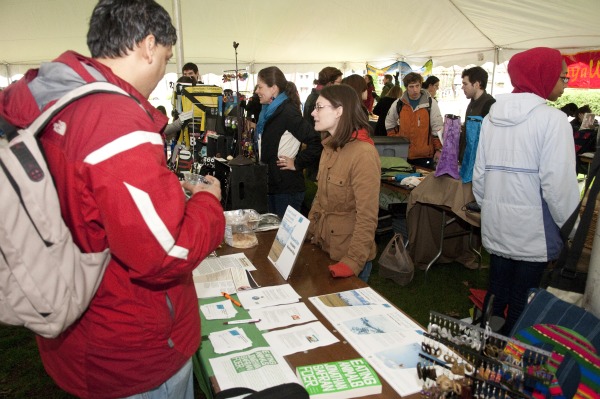 Vikram Dwarkadas, Senior Research Associate in Astronomy & Astrophysics and SAGE Ambassador, stops by Earth Fest’s Meatless Mondays table to say hello and to check out other organizations at the event. Nearly 30 vendors from around Chicago and several University organizations participated in the University’s largest outdoor green festival. Photo by Lloyd DeGrane
Vikram Dwarkadas, Senior Research Associate in Astronomy & Astrophysics and SAGE Ambassador, stops by Earth Fest’s Meatless Mondays table to say hello and to check out other organizations at the event. Nearly 30 vendors from around Chicago and several University organizations participated in the University’s largest outdoor green festival. Photo by Lloyd DeGrane
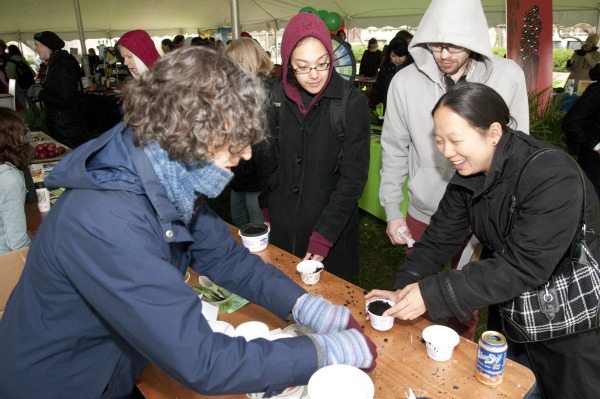 Ingrid Gould, Associate Provost for Faculty & Student Affairs and SAGE Ambassador, instructs Earth Fest attendees how to plant their own herbs. Over 100 people planted parsley, endive, dill, and cilantro seeds to take home and grow. Photo by Lloyd DeGrane
Ingrid Gould, Associate Provost for Faculty & Student Affairs and SAGE Ambassador, instructs Earth Fest attendees how to plant their own herbs. Over 100 people planted parsley, endive, dill, and cilantro seeds to take home and grow. Photo by Lloyd DeGrane
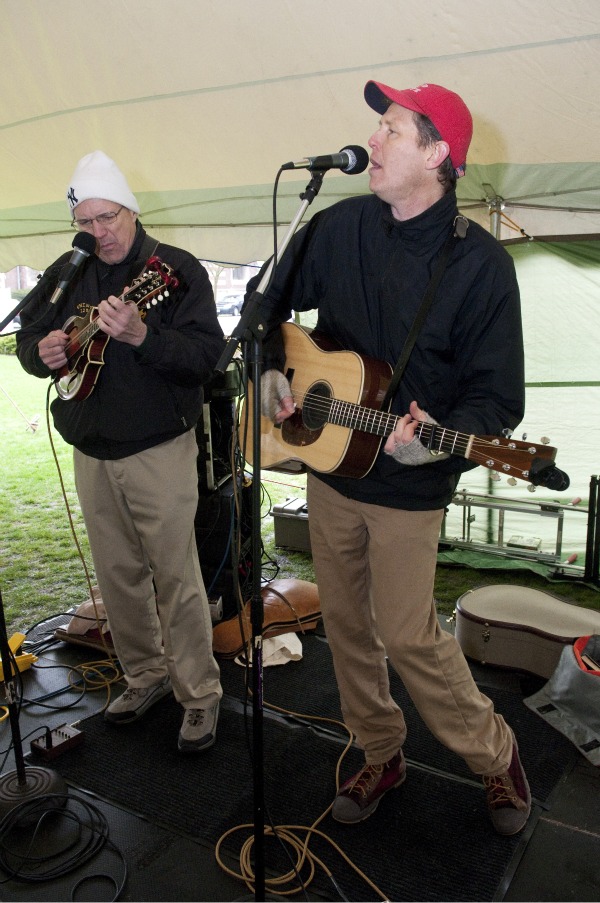 Don Stiernberg and Robbie Fulks weathered the rain to perform from 12-1pm on the Main Quad. Attendees enjoyed the lively performance while having lunch and taking refuge from the rain. Photo by Lloyd DeGrane
Don Stiernberg and Robbie Fulks weathered the rain to perform from 12-1pm on the Main Quad. Attendees enjoyed the lively performance while having lunch and taking refuge from the rain. Photo by Lloyd DeGrane
Approximately 97% of the 34 million tons of food waste generated annually in the US is thrown away, making food waste the single largest component of the waste stream reaching American landfills. But food waste doesn’t have to go into the garbage—most excess food can be recycled as compost and turned into very rich soil. Compost is often created outside in piles or bins, but many of us live in apartments with no backyard. What’s a conscientious city-dweller to do? Try vermiculture!
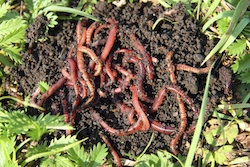
Vermiculture, also called vermicompost, is a small scale, indoor composting system that uses worms to turn organic waste like food scraps, coffee grounds, and paper into soil. Vermiculture is unobtrusive and fun and produces nutrient rich soil in 2 to 4 months—perfect for houseplants and seedlings.
You can either make your own vermicompost system or buy a start up kit. To make your own, begin with a sturdy plastic bin or wood box, add newspaper bedding, a few handfuls of soil, and worms. The worms aren’t the ones found in your garden—they’re called red wigglers and are sold locally by Windy City Worms. Windy City Worms also has complete start up kits available as well as delivery options. Unlike pets, the worms don’t require frequent tending, making them perfect for college life and office environments, as leaving them for a couple of weeks isn’t an issue.
For more detailed instructions on starting and maintaining your own vermiculture, check out the Chicago Recycling Coalition’s instruction manual or One Change’s DIY guide.
- Madelyn Freed
A big congratulations to Blackstone Bicycle Works, with whom we are proud partners on the recycles bike share program! Based out of the Experimental Station at 61st and Blackstone, Blackstone Bicycle Works runs a not-for-profit bike shop and youth education program and was recently honored as the first-ever Seattle’s Best Brew-lanthropy award recipient.
If you haven’t already seen it, check out this wonderful piece shot in March. You can spot our bike share mechanic, Kevin, in the purple hat at the end!
